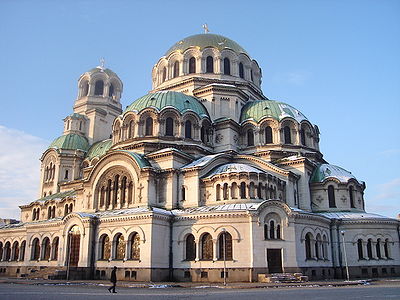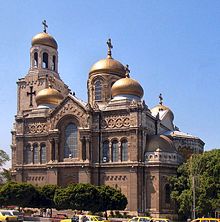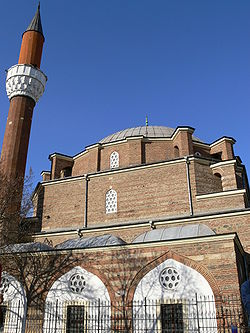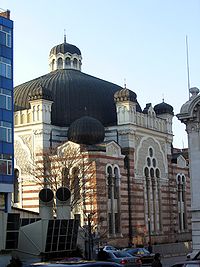
Religion in Bulgaria
Encyclopedia

Bulgaria
Bulgaria , officially the Republic of Bulgaria , is a parliamentary democracy within a unitary constitutional republic in Southeast Europe. The country borders Romania to the north, Serbia and Macedonia to the west, Greece and Turkey to the south, as well as the Black Sea to the east...
has been traditionally a Christian
Christian
A Christian is a person who adheres to Christianity, an Abrahamic, monotheistic religion based on the life and teachings of Jesus of Nazareth as recorded in the Canonical gospels and the letters of the New Testament...
state since the adoption of Constantinople Christianity
Christianization of Bulgaria
The Christianization of Bulgaria was the process by which 9th-century medieval Bulgaria converted to Christianity. It was influenced by the khan's shifting political alliances with the kingdom of the East Franks and the Byzantine Empire, as well as his reception by the Pope of the Roman Catholic...
in 865, and therefore the dominant confession is Eastern Orthodoxy of the Bulgarian Orthodox Church
Bulgarian Orthodox Church
The Bulgarian Orthodox Church - Bulgarian Patriarchate is an autocephalous Eastern Orthodox Church with some 6.5 million members in the Republic of Bulgaria and between 1.5 and 2.0 million members in a number of European countries, the Americas and Australia...
. During the Ottoman
Ottoman Empire
The Ottoman EmpireIt was usually referred to as the "Ottoman Empire", the "Turkish Empire", the "Ottoman Caliphate" or more commonly "Turkey" by its contemporaries...
rule of the Balkans
Balkans
The Balkans is a geopolitical and cultural region of southeastern Europe...
Islam
Islam
Islam . The most common are and . : Arabic pronunciation varies regionally. The first vowel ranges from ~~. The second vowel ranges from ~~~...
established itself in Bulgaria, Roman Catholicism has roots in the country since the Middle Ages
Middle Ages
The Middle Ages is a periodization of European history from the 5th century to the 15th century. The Middle Ages follows the fall of the Western Roman Empire in 476 and precedes the Early Modern Era. It is the middle period of a three-period division of Western history: Classic, Medieval and Modern...
, and Protestantism
Protestantism
Protestantism is one of the three major groupings within Christianity. It is a movement that began in Germany in the early 16th century as a reaction against medieval Roman Catholic doctrines and practices, especially in regards to salvation, justification, and ecclesiology.The doctrines of the...
arrived in the 19th century.
The Constitution of Bulgaria
Constitution of Bulgaria
The Constitution of Bulgaria is the supreme and basic law of the Republic of Bulgaria. The current constitution was adopted on 12 July 1991 by the 7th Grand National Assembly of Bulgaria, and defines the country as a unitary parliamentary republic...
designates Orthodoxy as the "traditional" religion of the country, but guarantees the free exercise of religion. Bulgaria has not experienced any significant-scale ethnico-religious confrotation as was the case in the former Yugoslavia in the 1990s and 2000s. The religious communities in the country coexist peacefully.
In fact, the capital Sofia
Sofia
Sofia is the capital and largest city of Bulgaria and the 12th largest city in the European Union with a population of 1.27 million people. It is located in western Bulgaria, at the foot of Mount Vitosha and approximately at the centre of the Balkan Peninsula.Prehistoric settlements were excavated...
is known for its so-called Triangle of Religious Tolerance: the St Nedelya Church
St Nedelya Church
Holy Sunday Church is an Eastern Orthodox church in Sofia, the capital of Bulgaria, a cathedral of the Sofia bishopric of the Bulgarian Patriarchate. Sveta Nedelya is a medieval church that has suffered destruction through the ages and has been reconstructed many times.-History:The history of the...
, Banya Bashi Mosque
Banya Bashi Mosque
Banya Bashi Mosque is a mosque in Sofia, Bulgaria. Its construction was completed in 1576, during the years the Ottomans had control of the town. The mosque derives its name from the phrase Banya Bashi, which means many baths...
and Sofia Synagogue
Sofia Synagogue
The Sofia Synagogue is the largest synagogue in Southeastern Europe, one of two functioning in Bulgaria and the third-largest in Europe.Constructed for the needs of the Bulgarian capital Sofia's mainly Sephardic Jewish community after a project by the Austrian architect Friedrich Grünanger, it...
are located within metres of each other in the very centre of the city.
Demographics

| Religious group | Population | Percentage |
|---|---|---|
| Orthodox Christians | 6,552,751 | 82.64% |
| Muslims Islam in Bulgaria Islam is the largest minority religion in Bulgaria. According to the 2001 Census, the total number of Muslims in the country stood at 577,139, corresponding to 10 % of the population... |
966,978 | 12.20% |
| No religion | 283,309 | 3.57% |
| Roman Catholic Roman Catholicism in Bulgaria Roman Catholicism is the third largest religious congregation in Bulgaria, after Eastern Orthodoxy and Islam. It has roots in the country since the Middle Ages and is part of the worldwide Roman Catholic Church, under the spiritual leadership of the Pope and curia in Rome.As an entity, the Catholic... Christians |
43,811 | 0.55% |
| Protestant Protestantism in Bulgaria Protestantism in Bulgaria: Protestantism is the fourth largest religious grouping in Bulgaria after Eastern Orthodoxy, Islam and Roman Catholicism. In the census of 2001, a total of 42,308 people declared themselves to be Protestants of different denominations, up from 21,878 in the previous census... Christians |
42,308 | 0.53% |
| Other | 14,937 | 0.19% |
| Not stated | 24,807 | 0.31% |
| Total | 7,928,901 | 100% |
Orthodox Christianity

Bulgarians
The Bulgarians are a South Slavic nation and ethnic group native to Bulgaria and neighbouring regions. Emigration has resulted in immigrant communities in a number of other countries.-History and ethnogenesis:...
, who are adherents of the Bulgarian Orthodox Church
Bulgarian Orthodox Church
The Bulgarian Orthodox Church - Bulgarian Patriarchate is an autocephalous Eastern Orthodox Church with some 6.5 million members in the Republic of Bulgaria and between 1.5 and 2.0 million members in a number of European countries, the Americas and Australia...
. Other Orthodox churches represented in the country by minorities are the Russian Orthodox Church
Russian Orthodox Church
The Russian Orthodox Church or, alternatively, the Moscow Patriarchate The ROC is often said to be the largest of the Eastern Orthodox churches in the world; including all the autocephalous churches under its umbrella, its adherents number over 150 million worldwide—about half of the 300 million...
, Ukrainian Orthodox Church
Ukrainian Orthodox Church
Ukrainian Orthodox Church may refer to:*Ukrainian Orthodox Church , established in 1990*Ukrainian Orthodox Church of the Kyivan Patriarchate, established in 1992*Ukrainian Autocephalous Orthodox Church, established in 1921...
, Romanian Orthodox Church
Romanian Orthodox Church
The Romanian Orthodox Church is an autocephalous Eastern Orthodox church. It is in full communion with other Eastern Orthodox churches, and is ranked seventh in order of precedence. The Primate of the church has the title of Patriarch...
and Greek Orthodox Church
Church of Greece
The Church of Greece , part of the wider Greek Orthodox Church, is one of the autocephalous churches which make up the communion of Orthodox Christianity...
.
Christianity was established in the First Bulgarian Empire
First Bulgarian Empire
The First Bulgarian Empire was a medieval Bulgarian state founded in the north-eastern Balkans in c. 680 by the Bulgars, uniting with seven South Slavic tribes...
under Boris I
Boris I of Bulgaria
Boris I, also known as Boris-Mihail and Bogoris was the Knyaz of First Bulgarian Empire in 852–889. At the time of his baptism in 864, Boris was named Michael after his godfather, Emperor Michael III...
in the middle of the 9th century, although it has had its roots in the Balkans since the 1st century and the mission of Apostle Paul. The rise of the Bulgarian Empire made the Bulgarian Orthodox Church autocephalous in 919, becoming the first new Patriarchate to join the initial Pentarchy
Pentarchy
Pentarchy is a term in the history of Christianity for the idea of universal rule over all Christendom by the heads of five major episcopal sees, or patriarchates, of the Roman Empire: Rome, Constantinople, Alexandria, Antioch, and Jerusalem...
. The Bulgarian Orthodox Church is the oldest among the Slavic Orthodox
Slavic Orthodox
Slavic Orthodox Church or Slavonic Orthodox Church is an umbrella term for East Orthodox churches that use Church Slavonic in liturgy, the latter being of Byzantine Rite...
churches and has considerably influenced the rest of the Slavic Orthodox world by means of its rich literary and cultural activity in the Middle Ages, as well as by the invention of the Cyrillic alphabet
Cyrillic alphabet
The Cyrillic script or azbuka is an alphabetic writing system developed in the First Bulgarian Empire during the 10th century AD at the Preslav Literary School...
in Bulgaria.
Islam

Turks in Bulgaria
The Turks in Bulgaria number 588,318 people and constitute 8.8% of those who declared their ethnic group and 8.0% of the total population according to the 2011 Bulgarian census. 605,802 persons or 9.1% of the population pointed Turkish language as their mother tongue. They are also the largest...
, the Muslim Bulgarians (Pomaks
Pomaks
Pomaks is a term used for a Slavic Muslim population native to some parts of Bulgaria, Turkey, Greece, the Republic of Macedonia, Albania and Kosovo. The Pomaks speak Bulgarian as their native language, also referred to in Greece and Turkey as Pomak language, and some are fluent in Turkish,...
) and most of the Roma
Roma in Bulgaria
The Roma in Bulgaria are the country's second largest minority and third largest ethnic group . According to the 2001 census, there were 370,908 Roma in Bulgaria, equivalent to 4.7% of the country's total population, making Bulgaria the European country with the highest percentage of Roma.Experts'...
. The former two are concentrated in the Rhodopes, a massif in southern Bulgaria, but are present in clusters in other parts of the country, e.g. the Turks in the Ludogorie
Ludogorie
The Ludogorie or Deliorman is a region in northeastern Bulgaria stretching over the plateau of the same name. Major cities in the region are Razgrad, Novi Pazar, Pliska and Isperih...
region and the Pomaks in the Rhodopes and some villages in northern Bulgaria.
Islam arrived with the Ottoman Turkish
Ottoman Turks
The Ottoman Turks were the Turkish-speaking population of the Ottoman Empire who formed the base of the state's military and ruling classes. Reliable information about the early history of Ottoman Turks is scarce, but they take their Turkish name, Osmanlı , from the house of Osman I The Ottoman...
conquest of the Balkans in the 14th-15th century. Turkish notables settled in the larger cities (Plovdiv
Plovdiv
Plovdiv is the second-largest city in Bulgaria after Sofia with a population of 338,153 inhabitants according to Census 2011. Plovdiv's history spans some 6,000 years, with traces of a Neolithic settlement dating to roughly 4000 BC; it is one of the oldest cities in Europe...
, Sofia, Varna
Varna
Varna is the largest city and seaside resort on the Bulgarian Black Sea Coast and third-largest in Bulgaria after Sofia and Plovdiv, with a population of 334,870 inhabitants according to Census 2011...
, etc.), while peasants from Anatolia
Anatolia
Anatolia is a geographic and historical term denoting the westernmost protrusion of Asia, comprising the majority of the Republic of Turkey...
arrived in the Ludogorie and the Rhodopes. Many Orthodox Christians and Paulicians converted to Islam, often voluntarily due to the peculiarities of the Ottoman millet
Millet (Ottoman Empire)
Millet is a term for the confessional communities in the Ottoman Empire. It refers to the separate legal courts pertaining to "personal law" under which communities were allowed to rule themselves under their own system...
system, but sometimes forcefully. After the Liberation of Bulgaria
Liberation of Bulgaria
In Bulgarian historiography, the term Liberation of Bulgaria is used to denote the events of the Russo-Turkish War of 1877-78 that led to the re-establishment of Bulgarian state with the Treaty of San Stefano of March 3, 1878, after the complete conquest of the Second Bulgarian Empire, which...
in 1878 many of the Muslims left Bulgaria, but others chose to remain.
Today, Muslims form the majority in Kardzhali Province
Kardzhali Province
Kardzhali Province is a province of southern Bulgaria, neighbouring Greece with the Greek prefectures of Xanthi, Rhodope and Evros to the south and east. Kardzhali Province area is 3209.1 km². Its main city is Kardzhali.-History:...
and Razgrad Province
Razgrad Province
Razgrad Province , former name Razgrad okrug) is a province in Northeastern Bulgaria, geographically part of the Ludogorie region. It is named after its administrative and industrial centre - the town of Razgrad...
(mainly Turks) and Smolyan Province
Smolyan Province
-Religion:The Smolyan province along with the Kardzhali Province is a province where the predominant religion is not Orthodox Christianity but Islam. However, unlike Kardzhali where the majority of the population is Turkish, the Muslim population of the Smolyan province is made up almost entirely...
(mainly Pomaks).
Catholic Christianity

Saxons
The Saxons were a confederation of Germanic tribes originating on the North German plain. The Saxons earliest known area of settlement is Northern Albingia, an area approximately that of modern Holstein...
ore miners in northwestern Bulgaria (around Chiprovtsi
Chiprovtsi
Chiprovtsi is a small town and municipality in northwestern Bulgaria, administratively part of Montana Province. It lies on the shores of the river Ogosta in the western Balkan Mountains, very close to the Bulgarian-Serbian border...
) and by missionaries among the Paulician and Bogomil
Bogomilism
Bogomilism was a Gnostic religiopolitical sect founded in the First Bulgarian Empire by the priest Bogomil during the reign of Tsar Petar I in the 10th century...
sectarians, as well as by Ragusan
Republic of Ragusa
The Republic of Ragusa or Republic of Dubrovnik was a maritime republic centered on the city of Dubrovnik in Dalmatia , that existed from 1358 to 1808...
merchants in the larger cities. The total number of the Roman Catholics in the country is around 40,000.
Today the bulk of the Roman Catholic population of Bulgaria lives in Plovdiv Province
Plovdiv Province
Plovdiv Province is a province in central southern Bulgaria. It comprises 18 municipalities on a territory of 5,972.9 km² with a total population, as of December 2009, of 701,684 inhabitants...
, centred around Rakovski
Rakovski (town)
Rakovski is a town in southern Bulgaria, in the historical region of Thrace. It is located in the Plovdiv Province. The town is also the centre of the Rakovski Municipality. Rakovski was founded in 1966 with the merging of three villages — General Nikolaevo, Sekirovo and Parchevich...
, as well as in some villages in northern Bulgaria. The Banat Bulgarians
Banat Bulgarians
The Banat Bulgarians are a distinct Bulgarian minority group which settled in the 18th century in the region of the Banat, which was then ruled by the Habsburgs and after World War I was divided between Romania, Serbia, and Hungary...
are a Bulgarian minority in Romania
Romania
Romania is a country located at the crossroads of Central and Southeastern Europe, on the Lower Danube, within and outside the Carpathian arch, bordering on the Black Sea...
and Serbia
Serbia
Serbia , officially the Republic of Serbia , is a landlocked country located at the crossroads of Central and Southeast Europe, covering the southern part of the Carpathian basin and the central part of the Balkans...
adhering to Roman Catholicism. Besides Bulgarians, among the Roman Catholics are also many foreigners.
The Bulgarian Greek Catholic Church
Bulgarian Greek Catholic Church
The Bulgarian Greek Catholic Church is a Byzantine Rite sui juris particular Church in full union with the Roman Catholic Church.-Middle Ages:...
, a Byzantine Rite
Byzantine Rite
The Byzantine Rite, sometimes called the Rite of Constantinople or Constantinopolitan Rite is the liturgical rite used currently by all the Eastern Orthodox Churches, by the Greek Catholic Churches , and by the Protestant Ukrainian Lutheran Church...
church united with Rome, was formed in the 19th century as part of the Bulgarian church struggle in order to counter the influence of the Patriarch of Constantinople, and has some 10,000 members today.
Protestant Christianity
Protestantism in its various forms arrived in the 19th century because of missionaries, mainly from the United StatesUnited States
The United States of America is a federal constitutional republic comprising fifty states and a federal district...
. Today it is a quickly growing confession, with membership having doubled from 1991 to 2001. Half of the Protestants in Bulgaria are newly-converted Roma, while the other half are for the most part Bulgarians.
Armenian Apostolic Christianity
The majority of the 10,832 Armenians in BulgariaArmenians in Bulgaria
Armenians are the fourth largest minority in Bulgaria, numbering 10,832 according to the 2001 census, while Armenian organizations estimate up to 22,000. They have been inhabiting the Balkans since no later than the 5th century, when they moved there as part of the Byzantine cavalry...
are members of the Armenian Apostolic Church
Armenian Apostolic Church
The Armenian Apostolic Church is the world's oldest National Church, is part of Oriental Orthodoxy, and is one of the most ancient Christian communities. Armenia was the first country to adopt Christianity as its official religion in 301 AD, in establishing this church...
, which has an eparchy in the country based in Sofia. Most Armenian Apostolics live in Plovdiv, Sofia, Varna or Burgas
Burgas
-History:During the rule of the Ancient Romans, near Burgas, Debeltum was established as a military colony for veterans by Vespasian. In the Middle Ages, a small fortress called Pyrgos was erected where Burgas is today and was most probably used as a watchtower...
.
Judaism


